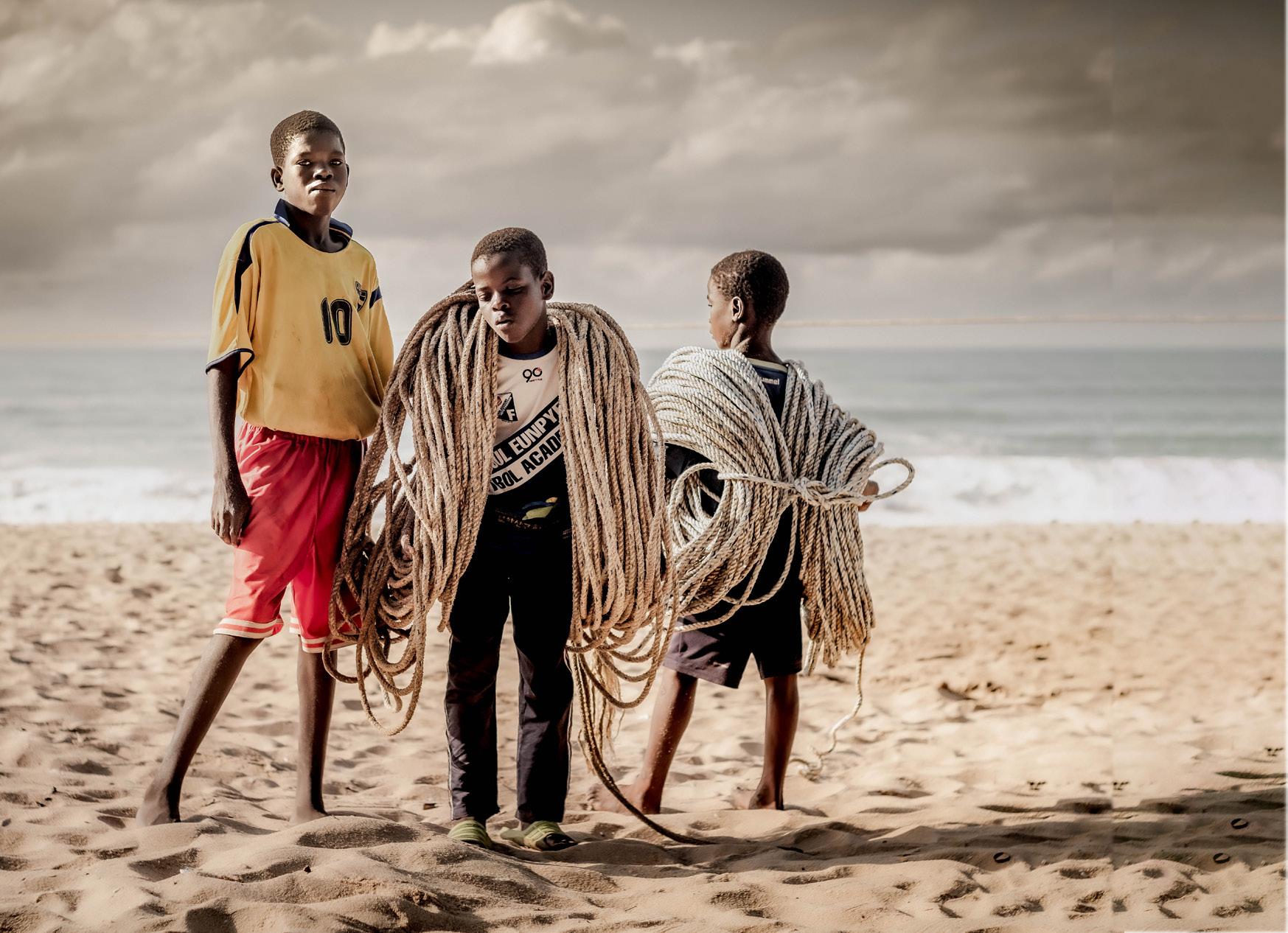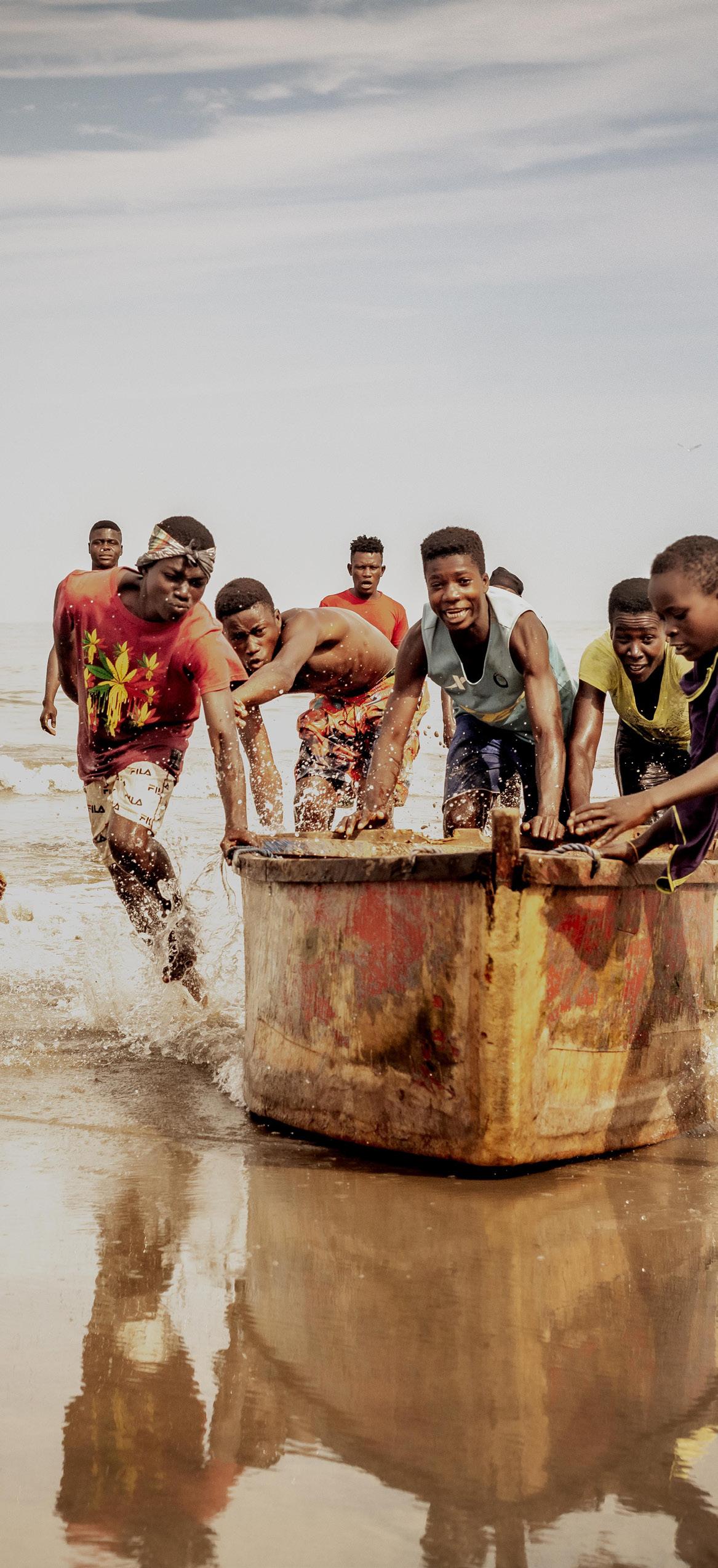
Policy Brief


Policy Brief
This policy brief outlines the findings from a Child Labor and Trafficking Vulnerability Assessment and the actions necessary to change behaviors, enhance understanding, and improve stakeholder coordination to address the issue.
In Ghanaian culture, children often help their parents and families with minor jobs like washing bowls and carrying light loads. In artisanal fisheries, many of these tasks, like mending nets, and processing and selling fish are family traditions and viewed as part of a child’s development. Other tasks, however, are hazardous and performed under harsh conditions, like going on multi-day fishing expeditions or diving underwater to untangle nets. As a cheap source of labor, many children also end up being trafficked and exploited, and girls often end up working on a multitude of tasks in addition to their domestic duties.
The tasks that have a high potential to affect the health and safety of children limit future development and are an infringement of children’s rights and a clear breach of local and international labor laws. Ghana’s laws prohibit child labor and trafficking (CLaT), yet the practice is prevalent in the fisheries sector and receives little visibility. While poverty and negligent parenting continues to drive CLaT, these policy recommendations can change behaviors, improve understanding, and improve stakeholder coordination around child labor and trafficking issues.

Child labor affects an average of 1.5 million children each year in Ghana, and 80% of them are caught in rural sectors like agroforestry and fisheries. Child labor rates decreased by 30% between 2013 to 2018, thanks to government efforts, but in fisheries children continue to perform dangerous jobs and are victims of trafficking.
Child labor is ubiquitous and is accepted as a normal part of coastal culture and an important development process in fisheries households.
CLaT can result in extreme bodily and mental harm, and even death under hazardous conditions.
Communities make no clear distinction between light work for children and worst forms of child labor.
Child fosterage, where a child is sent away to live with a relative, is common and a factor for trafficking, abuse, and exploitation.
Child trafficking often mirrors seasonal fisher migration, which is multidirectional and irregular, making it hard to predict or patrol.
"I was sent off to work for a crew, and the conditions were terrible. I was starving. One day, I ran off and made it to Accra where I begged on the street before returning back to my family. It was a terrible experience."
Child labor victim
A participatory approach builds on community strengths and local social mores to identify voluntary actions against CLaT. Since child labor and fosterage are part of the culture of fishing communities, a participatory approach that works with communities to shift social norms slowly and respectfully is the more constructive approach.
Raise awareness about social norms and the negative consequences of child labor and trafficking. Partner with local influencers to lead campaigns on children’s education.
Work with communities to find ways to encourage children to stay in school and to take the lead in organizing informal, community-based opportunities to support education, including bridge schools that help victims to reintegrate.
Engage communities with behavior change interventions to deconstruct the unhealthy gender roles and expectations of girls and boys, i.e. the additional household burdens placed on girls and the unique vulnerabilities of boys in fisheries.
Work with state and non-state partners to expand family planning and reproductive health services to rural fishing communities with a focus on guiding men and women towards healthy family planning practices and enhance efforts for broader public health education.
Promoting income diversification and financial empowerment builds resilience against CLaT. Fisherfolk facing financial challenges require support for skills training and services like stipends for food and mentoring to ensure they continue with training to gain economic empowerment. On-going social protection programmes like the Livelihood Empowerment Against Poverty (LEAP) should target femaleheaded single parent households.
“My neighbor’s daughter was trafficked a few months ago. We haven’t heard from her since. However, we know the woman (trafficker) is a pleasant person, so we trust that she would take good care of her.”
Woman respondent

“I wonder why our role is described as bad we do is improve the economic situations for children. They do not go to school because their parents cannot afford it. We bring them to our and businesses to give them an opportunity and make some money for their families. Otherwise, they would be wasting away with their parents.”
Fisherman respondent

Successful CLaT interventions require focused efforts from the Ministry of Fisheries and Aquaculture Development (MoFAD) and Fisheries Commission (FC), communitycentered approaches, and resources for prevention, rehabilitation and reintegration, and prosecution. and EXPLOITED when all for these their our homes opportunity to work Otherwise, parents.”
Long-held perceptions see child labor as normal and desired in fishing communities, forming a barrier to behavior change interventions.
Setting priorities for addressing CLaT and allocating resources to implement practical mitigation measures as part of a robust strategy requires that the MoFAD lead a national, anti-CLaT campaign in fisheries, and partner with stakeholders and the media.
Address economic vulnerabilities through a dedicated livelihood support program for vulnerable fishing households. Government initiatives such as Youth Enterprises Project, LEAP, and Technical Vocation and Education Training (TVET) programs should target vulnerable fisheries households.
MoFAD should build staff knowledge and understanding of CLaT in fisheries, and mainstream related responsibilities in scopes of work. Fisheries officers should identify CLaT hotspots, alert authorities to address them, and establish a database on CLaT in fisheries.
Stringent measures against perpetrators of CLaT contributes to prevention and reiterates that CLaT is unacceptable. Licenses and certifications should be revoked for fisherfolk engaged in CLaT. Anti-CLaT protocols should be included under the Safe Fish Certification Scheme along with mandates for comanagement associations to identify and address CLaT.
MoFAD and FC should coordinate with Gender, Children and Social Protection and Employment and Labor Relations Ministries, Marine Police, and others to implement child protection systems and establish protocols that disincentivize CLaT. MoFAD should lead an inter-agency commission that aligns issues like CLaT in fisheries with relevant agencies.
The decline in fishery production negatively affects household income, the lack of education provides few alternatives, and adults turn to children to supplement income.
Children in single parent, femaleheaded and large households are more vulnerable to trafficking, and mothers under financial stress are more likely to accept payment for their children.
The enforcement of Ghana’s law and policies that protect children’s rights is weak, and most cases of CLaT occur in the informal sector, which is harder to police.
Economic hardship drives children to fend for themselves, and parents are unaware or don’t bother to understand the conditions trafficked children live or work in.
The 2022 Understanding the Scope and Drivers of Child Labor and Trafficking Vulnerabilities in Fisheries Communities in Ghana assessment was carried out in partnership with the MoFAD and FC, and the findings will guide the FC and development partners in adopting approaches to mitigate CLaT in fisheries.
The assessment was conducted between December 2021 and March 2022 and includes data from the field and from secondary sources. Primary data was collected through 12 focus group discussions, consisting of 10-12 community members, in four coastal fisheries communities, namely Half Assini, Tema, Keta, and Elmina. Researchers obtained consent from parents and children, using ethical protocols to safeguard children, and conducted 68 random, in-depth individual interviews and 52 key-informant interviews with individuals who have first-hand knowledge or experiences of GBV. In total, 282 respondents (41% women, 30% men, and 29% children) provided data and experiences related to CLaT.
The MoFAD and its implementing agency the Fisheries Commission promote the development of Ghana’s Fisheries Sector as a viable economic segment that will contribute to the overall development of the country in line with long term national development policy framework.
The Feed the Future Ghana Fisheries Recovery Activity (GFRA) partners with the MoFAD and the FC to mitigate the near collapse of the small pelagic fisheries—sardinella, mackerel, and anchovies—and establish a foundation for their ecological recovery.


“Our parents do not put us to work with bad intentions. They love us and wish they could cater for our needs. Unfortunately, they cannot and must rely on options to help the family, including our labor and trafficking us. Even though it is hard, we still recognize their love for us.”
Child in a fishing community
Ghana Fisheries Recovery Activity gfra.info@tetratech.com
Ministry of Fisheries and Aquaculture Development
info@mofad.gov.gh